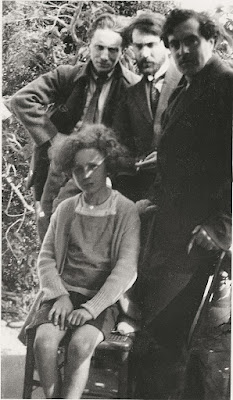NORTHERN STAR by STEWART PARKER at the Finsborough Theatre, London
NORTHERN STAR by STEWART PARKER
Paul Murphy, Finsborough Theatre, London
at the Finsborough theatre, London directed by Caitlin McLeod with Jonathan Harden, Clare McMahon, Michael Byers, Sean Pol McGreevy, Adam Best, Helen Belbin, Gemma-Leah Devereux, Mark Edel-Hunt, Anthony Delaney
The Finsborough theatre is an intimate venue meaning a miniature theatre set above a wine bar and restaurant in the Kensington & Chelsea area of London. The theatre specialises in re-discovering neglected masterpieces, this is the first revival of this play in ten years, so it comes as no surprise that a late Stewart Parker play is being re-examined here in the context of Ireland's recent bankruptcy. For we can also suppose that the default will trigger another great exodus of Irish people (but where?).
The play deals with the life and times of Henry Joy McCracken (1767-1798), sometime member of the United Irishmen, revolutionist, nationalist in an era before Nationalism. Firstly its obvious that the minimal resources of the theatre were stretched to the limits, in fact most of the plays undoubted intelligibility depended on the quality of the acting which was always extremely good but placed extreme demands on a young cast. Jonathan Harden as Henry Joy was undoubtedly exceptional. The mise en scene was bare, except for a noose, always hanging menacingly over the stage, as if to say that all the events are dominated as they were historically by the spectre of sudden, violent death. For both McCracken and Theobald Woolf Tone (1763-1798) were executed by the British government (or as in the case of Woolf Tone, committed suicide before being hung). All the props, sound effects, lighting effects were accurate, efficient and complete within the terms the play proposes. Production values were minimal, all the accents native although sceptics might argue that they occasionally sounded more akin to Father Ted than 18th century Ireland. The costumes also insisted on a high degree of verisimilitude, this depended on the credulity or ignorance of the audience who might not be aware of what a late 18th century Irish musket looked like, how British regular soldiers in Ireland dressed or how McCracken himself might have been dandified, uniformed or whatever. Of course exactitude hardly matters if the spirit of the time is captured.
The play looks back at the events of the past in order to examine the failures and dilemmas of the present. The defeat of Wolfe Tone's rebellion in 1798, the destruction of the French fleet off Bantry Bay and a French army in Ireland is the context within which stark alternatives for Ireland are re-told with complete intellectual vigour, a vigour which is surprising, indeed shocking in the context of today's vapid celebrity culture. Of course there's no better place to go to observe that than Kensington and Chelsea. However this play is never exacting drama, boiling down as it does to a number of important dialogues. It is peculiarly bereft of any dramatic dynamic being more like a thesis or exposition and that's a major fault of the play.
The theatre itself seemed to lay some especial emphasis on the kind of committment necessary to sit through and enjoy this play. The alternate context for the play which seemed fully realised, was the backstreets of Belfast, where McCracken himself grew up, eventually being executed at Corn Market in the very heart of Belfast. McCracken muses on the various invasions of Ireland, noting that he himself is a mixture of French Hugenot and Scottish Covenanter. He's offered a stark choice between a life as a revolutionist and a (so-called) normal life, a pen portrait offered to him as a trader in Philadelphia, for instance. In a sense McCracken is a paradigm of the writer, choosing to live beyond society in order to activate his revolution, separated from that society by the sense of some over-whelming mission or, as in Stewart Parker's case, merely by the position of almost permanent illness. One thinks of Keats or Alexander Pope (who famously remarked "This long disease, my life...").
The play could have dealt with the various revisions of Irish history that have been put forward, portraying McCracken as victim, martyr, villain. Is the play positioning itself in the 18th century or in the 20th and what about all the intervening history? Do we view McCracken's idealist pronouncements through our own vision of Ireland that has been distorted by centuries of propaganda from all sides? The revisionist debate itself could have been a topic of the play, distancing itself from its material by being a play about making a play about Ireland rather than a lucid demonstration of what actually happened. History itself is a script that is constantly altering, a beachy margin constantly shifting between time and tides.
This play is only the beginning of the exposition, a constantly unfolding nightmare that we are condemned to, just as McCracken is condemned becoming a martyr who's death is constantly re-enacted in both mythical and actual terms.

Comments